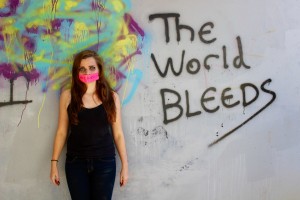Women across the United States are being tortured, abused, and degraded each day thanks to the booming industry of sex trafficking.
Sex trafficking is “When people are forced or coerced into the commercial sex trade against their will, ” according to the National Human Trafficking Resource Center. What is the problem at Western Carolina University? Awareness. We are blind to what is happening around us.
“One of the biggest things we can do here is raise awareness, “ said Liz Nason, a junior at WCU, majoring in Biology. “Once you hear about it, you can’t just be like, “oh that sucks.” Everyone gets fired up. They want to make a change, and they tell their friends and it spreads like wildfire,” said Nason.
Nason visited Las Vegas this summer with a student ministry. They partnered up with an anti human trafficking organization called “Free International,” based in Vegas. They went to workshops to learn about sex trafficking and know how to identify people being trafficked. They also did outreach projects to help victims of sex trafficking. She believes partnering up with an organization like a church or school that is already involved would be one of the first steps to learning about it.
Video produced by Rhianna Moncrief.
At WCU, many of us do not hear much about this industry. We hear about everything else going on in the world, but not the 32 billion dollar human trafficking business with 2.4 million victims all over the world; 80 percent being sexual slaves according to USA Today. This is not only happening in other countries, like Cambodia and India. It is happening right here, right now. The US is the number one destination for child sex trafficking.
“Trafficking is happening in every city across our country. It’s putting women and children in harms way and funding organized crime. It’s not only victimizing the most vulnerable among us, it’s harming all of us,” said Adam Hartzell for WCJ in an e-mail interview. Hartzell is an attorney and former executive director of Interact, a non-profit agency that provides support and awareness to survivors of domestic violence and sexual assault.
Sophomore Kristie Watkins, majoring in communications and international studies decided she wanted to make a difference at a young age. She started an organization called “Save Our Sisters” in 2010 when she was just 14 years old, the same age as many of the girls being trafficked. Her organization blossomed into something much larger than she anticipated.
“You can make a difference,” she said. She joked about it sounding cheesy, but what her and her friends did impacted the lives of women across the globe.
“The biggest reward is being able to encourage people to chase after their passions,” explained Watkins. When she began “Save our Sisters”, she had no idea how much awareness they would be able to raise. After participating in speaking engagements across schools, churches, and conferences, she realized anything is possible.
According to a recent CNN study, Atlanta, Georgia’s sex industry is bringing in nearly $290 million a year. The National Human Trafficking Resource Center claims that over 35,000 sex trafficking cases were reported last year. Students need to be educated on the subject, so we can do something about it. Sex slavery is a violation of human rights and clearly violates a woman’s right to life and liberty.
Many young girls are trafficked off of college campuses, ages 17-19. Young female students who are far away from home and do not have any close family makes them prime targets. According to the Women’s Funding Network, the ages are getting younger and younger. The average age in street prostitution is between 12 and 14, and as young as nine years old, according to Her Campus.
“No one looks at it and says that it’s “kind of bad”. It’s one of the worst issues that society is facing. Once we have a solid awareness about this issue, that’s when we are going to see change,” said Nason.




